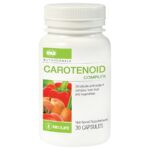Human Immune Function:
Facts and Realities for Today, and Always
BY JOHN MILLER
SAB Director, Product Technologist, Researcher
As everyone in the world comes to grips with the realities of the COVID-19 pandemic I thought it would be a good time for us to remind ourselves of how important our immune system is, how much we take it for granted and how much it is dependent upon our ability to provide it with the nutrition it needs to deliver its highest level of protection. This is a message the SAB has been delivering for decades, but it has never been more appropriate than right now. Science has proven beyond doubt that our immune function is nutrition dependent. That the absence or presence of important nutritional components has a profound impact on our immune capacity, its ability to protect us and thus our survival. When nutrition is poor our immune systems are compromised, when nutrition is good our immune systems are good. When our nutrition is great our immune systems can reach their highest potential to protect us from the widest array of challenges. It is never too late to work on maximizing your immune systems ability to protect you! Focusing on immune boosting and immune balancing nutrition is something everyone can do. It is not a question of if it is possible, it is only a question of how strongly we all embrace it. Without going too deeply into this highly complex and critical topic there are a few key points about nutrition and immune function that I want to reaffirm.
First a few fundamental definitions:
- Nutrition – is the nourishment or energy received from the foods and nutrients delivered by the diet to support and promote health and growth.
- Malnutrition – is over consumption or under consumption of nourishment or energy needed to support health and growth and resulting in a negative health impact. For the purpose of this message I will focus on the impact of under nutrition, and the dietary deficiencies and inadequacies it represents, on immune function.
- Under-nutrition is a form of malnutrition where intake fails to meet needs.
- Under-nutrition results in immune dysfunction or compromise.
WHY GETTING ESSENTIAL VITAMIN AND MINERALS ARE SO IMPORTANT:
The relationship between nutrition and immune function has been well and clearly established by decades of scientific investigation. Under nutrition or deficiency of key essential vitamins and minerals is known to result in immune dysfunction or compromise. Immune-compromising vitamin and mineral deficiencies include vitamins A , D , C , E , B 6 , and B 12, folic acid, zinc, iron, copper, and selenium. This is not a new idea, but I felt that an article published in the January 2020 issue of the journal Nutrients, titled “A Review of Micro nutrients and the Immune System-Working in Harmony to Reduce the Risk of Infection” was timely and strongly reaffirms this well-known reality. They state, “Adequate amounts are essential to ensure proper function of physical barriers and immune cells; however, daily micro-nutrient intakes necessary to support immune function may be higher than current recommended dietary allowances.” The presence or absence of these immune-centric vitamins and minerals “modulates” our immune capability and strength. Simply stated that means when they are low in the diet, immune power is compromised or suppressed. Conversely, when they are abundant in the diet immune power is elevated. Sadly, most people are deficient in one or more of these key essential nutrients.
THE VITAL ROLES OF WHOLE-FOOD NUTRIENTS
- Carotenoids are a great example. These lipid soluble, colorful components that make carrots orange or peppers red are well documented in scientific literature to be immune modulators.
 Remember, modulation means when carotenoids are low in the diet immune capacity is suppressed. Conversely, when they are abundant in the diet immune capacity is elevated. This immune modulating effect has been shown in powerful clinical studies, including those done on NeoLife Carotenoid Complex and published in the American Journal of Clinical Nutrition.
Remember, modulation means when carotenoids are low in the diet immune capacity is suppressed. Conversely, when they are abundant in the diet immune capacity is elevated. This immune modulating effect has been shown in powerful clinical studies, including those done on NeoLife Carotenoid Complex and published in the American Journal of Clinical Nutrition.
- Polyphenols, which include Flavonoids, are another example of immune modulating whole-food nutrients. Amongst a growing body of evidence of immunological benefit, a 2018 review article in the Journal of Immunology Research titled “Regulation of Immune Function by Polyphenols” points out in their opening comments that “Polyphenols promote immunity to foreign pathogens via various pathways. Different immune cells express multiple types of polyphenol receptors that recognize and allow cellular uptake of polyphenols, which subsequently activate signaling pathways to initiate immune response.”
- The role of omega-3 fatty acids in immune function has not gotten the same level of attention as other nutrient groups. They are known more for their heart-healthy, anti inflammatory benefits.
 NeoLife research first touched on omega-3’s and immune function in our 2007 clinical trial that showed inflammatory balancing benefits. That was followed by evidence showing promotion of biomarkers of inflammation resolution and healing. More recently, evidence has emerged regarding their critical roles as signaling molecules, helping to coordinate and regulate the activity of immune cells. There is a great deal more to the importance of nutrition to optimal health and immunity. Thousands of articles and books have been written on the topic. But for the purpose of this message I will leave it here for now. If the above information sounds like what we have been saying about core nutritional products like Pro Vitality it should not be surprising. The importance of the wide array of nutrients it can contribute to lifelong health and vitality is an irrefutable reality of human biochemistry.
NeoLife research first touched on omega-3’s and immune function in our 2007 clinical trial that showed inflammatory balancing benefits. That was followed by evidence showing promotion of biomarkers of inflammation resolution and healing. More recently, evidence has emerged regarding their critical roles as signaling molecules, helping to coordinate and regulate the activity of immune cells. There is a great deal more to the importance of nutrition to optimal health and immunity. Thousands of articles and books have been written on the topic. But for the purpose of this message I will leave it here for now. If the above information sounds like what we have been saying about core nutritional products like Pro Vitality it should not be surprising. The importance of the wide array of nutrients it can contribute to lifelong health and vitality is an irrefutable reality of human biochemistry.

